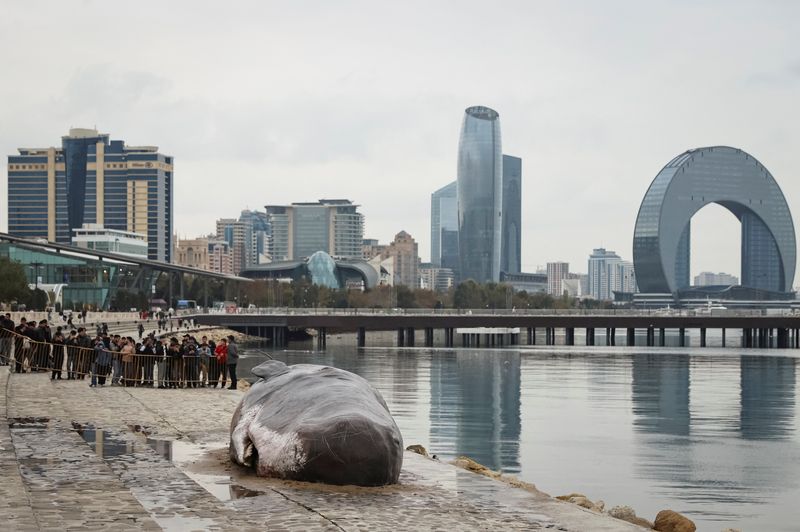By Gloria Dickie
BAKU (Reuters) – This yr’s U.N. local weather summit – COP29 – is being held throughout yet one more record-breaking yr of upper international temperatures, including strain to negotiations geared toward curbing local weather change.
The final international scientific consensus on local weather change was launched in 2021 by means of the Intergovernmental Panel on Local weather Change, nonetheless scientists say that proof exhibits international warming and its impacts are unfolding quicker than anticipated.
Right here is a few of the newest local weather analysis:
1.5C BREACHED?
The world might have already got hit 1.5 diploma Celsius (2.7 F) of warming above the typical pre-industrial temperature – a crucial threshold past which it’s vulnerable to irreversible and excessive local weather change, scientists say.
A gaggle of researchers made the suggestion in a examine launched on Monday based mostly on an evaluation of two,000 years of atmospheric gases trapped in Antarctic ice cores that extends the understanding of pre-industrial temperature tendencies.
Scientists have usually measured right this moment’s temperatures in opposition to a baseline temperature common for 1850-1900. By that measure, the world is now at practically 1.3 C (2.4 F) of warming.
However the brand new knowledge suggests an extended pre-industrial baseline, based mostly on temperature knowledge spanning the yr 13 to 1700, the examine revealed within the journal Nature Geoscience stated.
Both approach, 2024 is for certain to be the warmest yr on document.
SUPERCHARGED HURRICANES
Not solely is ocean warming fuelling stronger Atlantic storms, additionally it is inflicting them to accentuate extra quickly, for instance, leaping from a Class 1 to a Class 3 storm in simply hours.
Rising proof exhibits that is true of different ocean basins.
Hurricane Milton wanted solely sooner or later within the Gulf of Mexico in October to go from tropical storm to the Gulf’s second-most highly effective hurricane on document, slamming Florida’s west coast.
Hotter air can even maintain extra moisture, serving to storms carry and ultimately launch extra rain. Because of this, hurricanes are delivering flooding even in mountain cities like Asheville, North Carolina, inundated in September by Hurricane Helene.
WILDFIRE DEATHS
World warming is drying waterways and sapping moisture from forests, creating situations for greater and warmer wildfires from the U.S. West and Canada to southern Europe and Russia’s Far East creating extra damaging smoke.
Analysis revealed final month in Nature Local weather Change calculated that about 13% of deaths related to poisonous wildfire smoke, roughly 12,000 deaths, throughout the 2010s could possibly be attributed to the local weather impact on wildfires.
CORAL BLEACHING
With the world within the throes of a fourth mass coral bleaching occasion — the biggest on document — scientists worry the world’s reefs have handed some extent of no return.
Scientists shall be finding out bleached reefs from Australia to Brazil for indicators of restoration over the following few years if temperatures fall.
AMAZON ALARM
Brazil’s Amazon (NASDAQ:) is within the grips of its worst and most widespread drought since information started in 1950. River ranges sank to all-time lows this yr, whereas fires ravaged the rainforest.
This provides concern to scientific findings earlier this yr that between 10% and 47% of the Amazon will face mixed stresses of warmth and drought from local weather change, in addition to different threats, by 2050.
This might push the Amazon previous a tipping level, with the jungle not in a position to produce sufficient moisture to quench its personal bushes, at which level the ecosystem might transition to degraded forests or sandy savannas.
Globally, forests seem like struggling.
A July examine discovered that forests total final yr failed to soak up as a lot carbon dioxide from the ambiance as up to now, due largely to the Amazon drought and wildfires in Canada.
Which means a document quantity of CO2 entered the ambiance.
VOLCANIC SURGE
Scientists worry local weather change might even enhance volcanic eruptions.
In Iceland, volcanoes seem like responding to fast glacier retreat. As ice melts, much less strain is exerted on the Earth’s crust and mantle.
Volcanologists fear this might destabilize magma reservoirs and seems to be resulting in extra magma being created, build up strain underground.
Some 245 volcanoes internationally lie underneath or close to ice and could possibly be in danger.
OCEAN SLOWDOWN
The warming of the Atlantic might hasten the collapse of a key present system, which scientists warn might already be sputtering.

The Atlantic Meridional Overturning Circulation (AMOC), which transports heat water from the tropics to the North Atlantic, has helped to maintain European winters milder for hundreds of years.
Analysis in 2018 confirmed that AMOC has weakened by about 15% since 1950, whereas analysis revealed in February within the journal Science Advances, advised that it could possibly be nearer to a crucial slowdown than beforehand thought.




